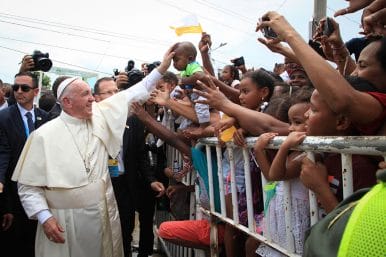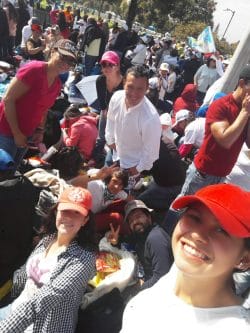
Foto: Jose-MIguel-Gomez – Conferenza Episcopale Colombiana
The Focolare also took an active role in parishes, for the preparation and unfolding of the Pope’s visit.
Susan Nuin, focolarina and member of CELAM (
Consejo Episcopal Latinoamericano), which gathers bishops from Latin America and the Caribbean explains: “Several things emerged quite strongly. First was the attendance of the State with the president and all the representatives of government. The second was the theme of reconciliation among the people, as well as social justice: Colombia is the country with the greatest percentile of social inequality.”
In one interview with AGI, director of Ciudad Nueva,
Sole Rubiano, explained: “In theory everyone is in favour of peace, but not everybody recognizes the need for inclusion and equity.” In Colombia, something unprecedented has been made possible.
Susanna Nuin writes: “Victims and murderers have prayed together and embraced one another. Not even in South Africa and other Latin American dictatorships have victims and murderers dealt with one another on equal terms. Institutional laws and accords are not sufficient in resolving conflict. Encounter is required between parties. Pope Francis has created a popular conscience that just wasn’t there before.”
In Villavicencio with its 500,000 residents, the Pope met with 3 thousand victims of violence, (150 thousand in the city alone), military, police agents and ex-guerrillas. That was the central moment of the visit, with the prayer meeting for national reconciliation in Las Malocas Park. At the centre of the stage, above an altar, the broken and amputated Bojayá Crucifix which, in May 2002, watched the massacre of dozens of people who had taken refuge in the church. Testimonies were given by ex-Farc members, paramilitary, and by one woman who had undergone all manner of abuse. On the same day, September 8
th, the Farc leader had written a letter to the Pope, asking forgiveness for “every pain inflicted on the people of Colombia.”
One young woman named Nayibe writes: “For us the amputee Christ is even more Christ-like, because it shows that he came to suffer for his people.” Many called it a day that would go down in the history of Colombia.
 Cartagena de Indias, north of Colombia, is the home of the Shrine of St Peter Claver
Cartagena de Indias, north of Colombia, is the home of the Shrine of St Peter Claver (1581-1654). He was declared a saint in 1888 and had been a Spanish Jesuit who dedicated himself to the tragic victims of slavery. At the suggestion of the Jesuits, after the peace accord between the government and the Farc which had put an end to the 50 years of conflict with 200 thousand dead and tens of thousands missing, it became the capital of human rights. The Pope visited the poorest neighbourhoods, stopping in at the house of 77 year old Lorenza Perez, who cooks and distributes meals to anyone in need. “I’m the poorest of the poor,” she says. “But the Pope chose my house to tell the world to have more love for those that are discarded.
Susanna Nuin explains: “The Pope’s speeches had two dimensions: on conceptual, with strong and precise clarifications; and the other gestural, to express his closeness to a people that has suffered much. His departure left us with a sense of loss, but also a sense of fulfilment. His visit has instilled a new way of living in the hearts of the Colombian people, no longer from a passive stance, waiting for a peace that never comes, succumbing to a polarization that makes peaceful coexistence impossible.
The young people played a fundamental role, who felt like they had been invested with a task.
Yolima Martínez recalls the Pope’s appeal: “You young people have a special gift for recognizing the suffering of others.”
Laura Isaza: “Peace is a process that engages all generations, but ours especially.”
Manuel echoes her words: “The Pope’s visit has clarified to the Colombians that peace isn’t a political matter, but culture that needs to be built. As Focolare members we feel even more committed to listen to Pope Francis when he talks about a culture of encounter that we have to continue to build.”
 Cartagena de Indias, north of Colombia, is the home of the Shrine of St Peter Claver (1581-1654). He was declared a saint in 1888 and had been a Spanish Jesuit who dedicated himself to the tragic victims of slavery. At the suggestion of the Jesuits, after the peace accord between the government and the Farc which had put an end to the 50 years of conflict with 200 thousand dead and tens of thousands missing, it became the capital of human rights. The Pope visited the poorest neighbourhoods, stopping in at the house of 77 year old Lorenza Perez, who cooks and distributes meals to anyone in need. “I’m the poorest of the poor,” she says. “But the Pope chose my house to tell the world to have more love for those that are discarded. Susanna Nuin explains: “The Pope’s speeches had two dimensions: on conceptual, with strong and precise clarifications; and the other gestural, to express his closeness to a people that has suffered much. His departure left us with a sense of loss, but also a sense of fulfilment. His visit has instilled a new way of living in the hearts of the Colombian people, no longer from a passive stance, waiting for a peace that never comes, succumbing to a polarization that makes peaceful coexistence impossible. The young people played a fundamental role, who felt like they had been invested with a task. Yolima Martínez recalls the Pope’s appeal: “You young people have a special gift for recognizing the suffering of others.” Laura Isaza: “Peace is a process that engages all generations, but ours especially.” Manuel echoes her words: “The Pope’s visit has clarified to the Colombians that peace isn’t a political matter, but culture that needs to be built. As Focolare members we feel even more committed to listen to Pope Francis when he talks about a culture of encounter that we have to continue to build.”
Cartagena de Indias, north of Colombia, is the home of the Shrine of St Peter Claver (1581-1654). He was declared a saint in 1888 and had been a Spanish Jesuit who dedicated himself to the tragic victims of slavery. At the suggestion of the Jesuits, after the peace accord between the government and the Farc which had put an end to the 50 years of conflict with 200 thousand dead and tens of thousands missing, it became the capital of human rights. The Pope visited the poorest neighbourhoods, stopping in at the house of 77 year old Lorenza Perez, who cooks and distributes meals to anyone in need. “I’m the poorest of the poor,” she says. “But the Pope chose my house to tell the world to have more love for those that are discarded. Susanna Nuin explains: “The Pope’s speeches had two dimensions: on conceptual, with strong and precise clarifications; and the other gestural, to express his closeness to a people that has suffered much. His departure left us with a sense of loss, but also a sense of fulfilment. His visit has instilled a new way of living in the hearts of the Colombian people, no longer from a passive stance, waiting for a peace that never comes, succumbing to a polarization that makes peaceful coexistence impossible. The young people played a fundamental role, who felt like they had been invested with a task. Yolima Martínez recalls the Pope’s appeal: “You young people have a special gift for recognizing the suffering of others.” Laura Isaza: “Peace is a process that engages all generations, but ours especially.” Manuel echoes her words: “The Pope’s visit has clarified to the Colombians that peace isn’t a political matter, but culture that needs to be built. As Focolare members we feel even more committed to listen to Pope Francis when he talks about a culture of encounter that we have to continue to build.”





0 Comments